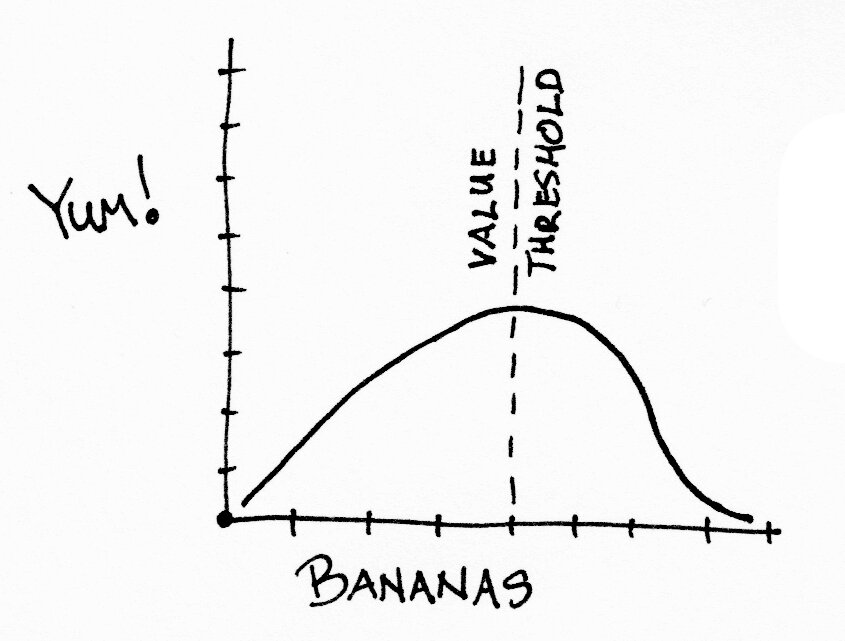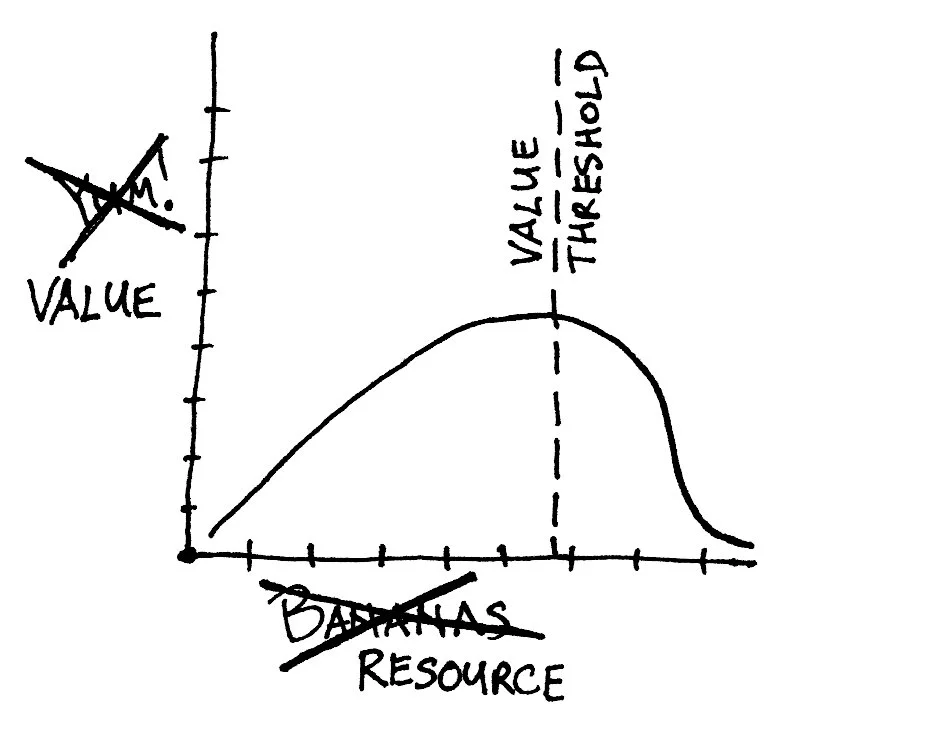Too Many Bananas
Something mystical happens when I pass through the sliding glass doors of a supermarket. Before I cross that mysterious threshold, I have a clear and logical awareness of my dietary needs. I know which foods I will need for the week and how much of them I will need. Then, something strange happens. It’s as if a step into the grocery store is a step into the twilight zone, the middle ground between light and shadow, science and superstition. It is in this dimension of imagination that I quickly lose all form of reason or memory.
(Photo Credit: Digital Trends)
It is here I forget how many bananas I’m capable of consuming.
It may seem dramatic but I assure you it is no exaggeration. I know precisely how many bananas I need each week to meet my insatiable appetite for breakfast smoothies, yet low and behold, time after time I again find my pantry stuffed with the squishy, yellow, freckled carnage of my fruit lusting eyeballs.
How often do we find ourselves in a similar place in life, lusting after more than we can sanely consume? Replace ‘bananas’ with whatever your drug of choice is and you’ll know what I mean: time, money, toys, relationships, accomplishments, houses, you get the picture. I clearly recognize I have a problem with bananas but do we recognize our problems with the others? Just as my eyes have a tendency to grow bigger than my fruit basket, so our to do lists expand beyond 24 hours and our wish lists have more decimal points than our checking account. How do we continue to fool ourselves into thinking that buying a dozen bananas is a good idea when our exasperated hindsight desperately screams at us that six is all we need?
Perhaps it is because we have not yet identified our value thresholds.
Value thresholds exist with every resource we have in our life, whether it be time, relationships, toys, or bananas.
For every resource we possess, there is a theoretical curve that exists. This curve illustrates how our value for the resource changes depending on how much of that resource we possess. With whatever the resource is, there is a natural tendency to experience an initial spike in appreciation when the amount of that resource is slim to none. Take bananas for example. Picture yourself in a world with no bananas (stop crying, we’re just pretending). Imagine your insatiable desire for the pure, fresh taste of that one banana blended perfectly into your cold, refreshing breakfast smoothie. Picture it as it mixes in a heavenly dance with its angelic counterparts of vanilla protein powder, almond milk, kale, and frozen blueberries and mangoes. Imagine the spike of joy and purpose your life would be injected with in that long-awaited moment as you take the first delectable sip. Oh, how you value that banana! You feel it, right? Now imagine that shortly after you finish that 24 ounces of ecstasy, BAZINGA!! Another banana appears!! What joy! What excitement! While it might not be quite as exciting as your first banana, the feeling is still certainly joyful and appreciative. You do still appreciate this second banana, just maybe slightly less than the first one (as a second born I can relate to this banana). Now imagine the same thing happens a third, fourth, and fifth time. With each banana comes a waning sense of appreciation for it. Now imagine instead of one banana at a time it becomes two, then three, then six, then a dozen bananas. Can you imagine how quickly your fruit basket would become a fruit fly bungalow?
Eventually you will reach what I call a value threshold. Up unto this point each additional banana has brought added joy to your life, even though each consecutive banana brings consistently less amounts of joy than the previous. One finally reaches a banana where the “yum” factor just isn’t there. From this point forward, something unfortunate happens: you begin to value your bananas less and less, perhaps even reaching a point where you no longer like bananas! You may try to force yourself to keep enjoying them the way you used to when there were less, but it is a “fruitless” effort.
Every resource we possess in life follows a pattern similar to our “banana curve”. We inevitably extend the greatest amount of value to our resources when we have less of them. As time goes on, that value slowly diminishes to the point where we reach the value threshold. From this point on, that resource switches from an addition to our lives to a detraction. Try as we might, we cannot force ourselves to value that resource in its oversupplied state any more than we can force ourselves to enjoy a dozen overripe, fruit fly infested bananas when six perfectly ripened bananas would have sufficed.
There’s a proverb that goes like this: “A lazy man does not roast his game but a diligent man prizes his possessions.” Imagine a man returning from the hunt with a magnificent kill that could feed him and his family for the coming weeks. Yet instead of cleaning the animal and quartering the meat, he instead goes out to get another one (after all, the first one was so rewarding and if one is good then two are surely better). However, by the time the hunter returns two days later with not one but three more kills, he discovers that his game from the previous hunt has now spoiled.
If only he had prized his possessions.
“A lazy man does not roast his game but a diligent man prizes his possessions.”
We live in a period of great prosperity where the possibility to possess more and more is nearly endless. The apostle Paul once said that, “Everything is permissible, but not everything is beneficial.” In a world that preaches the gospel of more, we can choose to follow the gospel of less. Culture quietly whispers to us that another hobby, another side hustle, another volunteer position is all that stands between us and total satisfaction. It tells us that the upgraded car or newer house is the ticket to our fulfillment. Despite its humble appearance, the gospel of more is surprisingly tenacious. Many of us fall prey to its heresy while claiming that we truly do prioritize our overflowing resource. We can say what we want about the things we value in life but it is our actions, not our words, that reveal our priorities.
It would be difficult not to recognize the societal decline in value of our resources. We work more now than ever before and yet have higher rates of suicide and depression. We have more hobbies and side hustles yet satisfaction seems painfully elusive. Our fruit baskets have become saturated with the weight of an unreasonable number of bananas. And we are to blame.
“We can say what we want about the things we value in life but it is our actions, not our words, that reveal our priorities.”
So what does it look like to deeply cherish and value our resources? It starts by figuring out what you really want in life. And I mean what you REALLY want in life. It’s been said that good is the enemy of great. What are the greatest things you could fill your life with? Grab on to those tightly and throw away the merely “good” things. Steve Jobs once said, “I’m as proud of what we don’t do as I am of what we do.” Don’t be afraid to say no to the things that will take away from the value of what matters most to you. Next, find your value thresholds. Do you value these lines as life-giving boundaries or do you charge past them in the vain pursuit of the gospel of more? Once you recognize that you will only value your resource less and less after crossing that threshold, you can begin to create healthy practices in your life that will help you to maximize the value of your resources to you. Remember, it’s one thing to say you value something, it’s another thing to act like it. Show me your actions and I’ll show you your priorities.
“What are the greatest things you could fill your life with? Grab on to those tightly and throw away the merely “good” things.”
Can you smell hints of overripe bananas in your life? Can you look to your schedule or possessions and see instances where you have pushed beyond your value thresholds? Imagine, for a second, what your life could be if there was less. Imagine the greater freedom you could experience if you stripped life down to only the great things and began to honor your value thresholds. And now, as you consider these things, I leave you with this “interpretation” of the proverb I shared earlier:
“A DISTRACTED man does not roast his bananas, but a diligent man prizes his bananas.”
Go prize your bananas.



